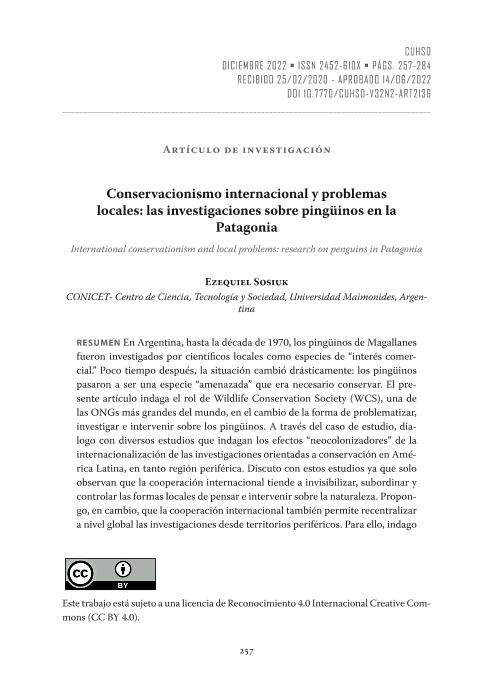Mostrar el registro sencillo del ítem
dc.contributor.author
Sosiuk, Ezequiel Daniel

dc.date.available
2023-06-30T19:06:39Z
dc.date.issued
2022-12
dc.identifier.citation
Sosiuk, Ezequiel Daniel; Conservacionismo internacional y problemas locales: las investigaciones sobre pingüinos en la Patagonia; Universidad Católica de Temuco. Facultad de Ciencias Sociales y Humanidades; Cuhso; 32; 2; 12-2022; 257-284
dc.identifier.uri
http://hdl.handle.net/11336/201986
dc.description.abstract
En Argentina, hasta la década de 1970, los pingüinos de Magallanes fueron investigados por científicos locales como especies de “interés comercial.” Poco tiempo después, la situación cambió drásticamente: los pingüinos pasaron a ser una especie “amenazada” que era necesario conservar. El presente artículo indaga el rol de Wildlife Conservation Society (WCS), una de las ONGs más grandes del mundo, en el cambio de la forma de problematizar, investigar e intervenir sobre los pingüinos. A través del caso de estudio, dialogo con diversos estudios que indagan los efectos “neocolonizadores” de la internacionalización de las investigaciones orientadas a conservación en América Latina, en tanto región periférica. Discuto con estos estudios ya que solo observan que la cooperación internacional tiende a invisibilizar, subordinar y controlar las formas locales de pensar e intervenir sobre la naturaleza. Propongo, en cambio, que la cooperación internacional también permite recentralizar a nivel global las investigaciones desde territorios periféricos. Para ello, indago tres aspectos de las investigaciones sobre pingüinos: a) cómo fue posicionado desde la Patagonia como indicador del cambio climático como problemática global, b) cómo la diversificación del financiamiento científico internacional permitió el desarrollo de investigaciones novedosas para el campo de la conservación de pingüinos, c) cómo el movimiento conservacionista permitió posicionar al litoral patagónico como un centro mundial del turismo basado en fauna. La investigación utiliza diversas metodologías cualitativas en base a entrevistas, observaciones de campo, documentos institucionales, curriculums de investigadores y datos sobre financiamiento extraídos de Web of Science.
dc.description.abstract
In Argentina, until the 1970s, Magellanic penguins were investigated by local scientists as species of "commercial interest." A short time later, the situation changed drastically: penguins became a threatened species that needed to be conserved. This article investigates the role of the Wildlife Conservation Society (WCS), one of the largest NGOs in the world, in changing the way of problematizing, investigating and intervening penguins. Through the case study, I dialogue with various studies that investigate the “neocolonizing” effects of the internationalization of conservation-oriented research in Latin America, as a peripheral region. I argue with these studies insofar as they only observe that international cooperation tends to make invisible, subordinate and control local ways of thinking and intervene on nature. Instead, I propose that international cooperation also allows global recentralization of research from peripheral territories. To do this, I investigate three aspects of research on penguins: a) how it was positioned, from Patagonia, as an indicator of climate change as a global problem, b) how the diversification of international scientific funding allowed the development of innovative research for the field of conservation of penguins, c) how the conservation movement allowed the Patagonian coast to be positioned as a world center for wildlife-based tourism. This research uses various qualitative methodologies based on interviews, field observations, institutional documents, researcher curricula, and funding data from Web of Science.
dc.format
application/pdf
dc.language.iso
spa
dc.publisher
Universidad Católica de Temuco. Facultad de Ciencias Sociales y Humanidades
dc.rights
info:eu-repo/semantics/openAccess
dc.rights.uri
https://creativecommons.org/licenses/by/2.5/ar/
dc.subject
CONSERVACIONISMO INTERNACIONAL
dc.subject
PINGÜINOS DE MAGALLANES
dc.subject
CIENCIA PERIFÉRICA
dc.subject
WILDLIFE CONSERVATION SOCIETY
dc.subject.classification
Tópicos Sociales

dc.subject.classification
Sociología

dc.subject.classification
CIENCIAS SOCIALES

dc.title
Conservacionismo internacional y problemas locales: las investigaciones sobre pingüinos en la Patagonia
dc.title
International conservationism and local problems: research on penguins in Patagonia
dc.type
info:eu-repo/semantics/article
dc.type
info:ar-repo/semantics/artículo
dc.type
info:eu-repo/semantics/publishedVersion
dc.date.updated
2023-06-29T13:13:12Z
dc.identifier.eissn
2452-610X
dc.journal.volume
32
dc.journal.number
2
dc.journal.pagination
257-284
dc.journal.pais
Chile

dc.journal.ciudad
Temuco
dc.description.fil
Fil: Sosiuk, Ezequiel Daniel. Consejo Nacional de Investigaciones Científicas y Técnicas; Argentina. Universidad Maimónides; Argentina
dc.journal.title
Cuhso
dc.relation.alternativeid
info:eu-repo/semantics/altIdentifier/url/https://portalrevistas.uct.cl/index.php/cuhso/article/view/2136
dc.relation.alternativeid
info:eu-repo/semantics/altIdentifier/url/https://www.scielo.cl/scielo.php?pid=S2452-610X2022005000304&script=sci_arttext
dc.relation.alternativeid
info:eu-repo/semantics/altIdentifier/doi/http://dx.doi.org/10.7770/cuhso-v32n2-art2136
Archivos asociados
